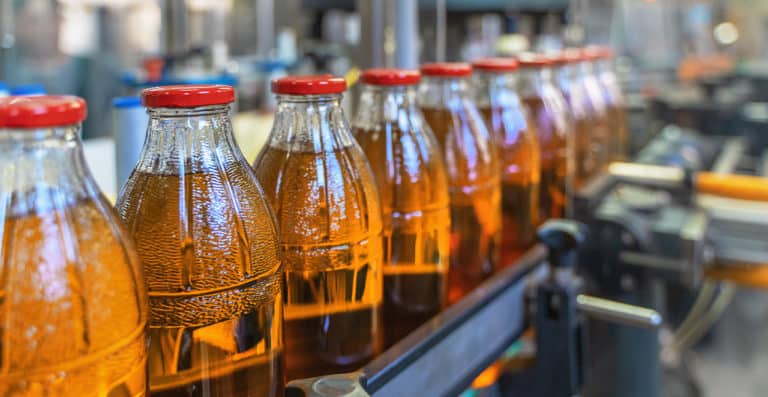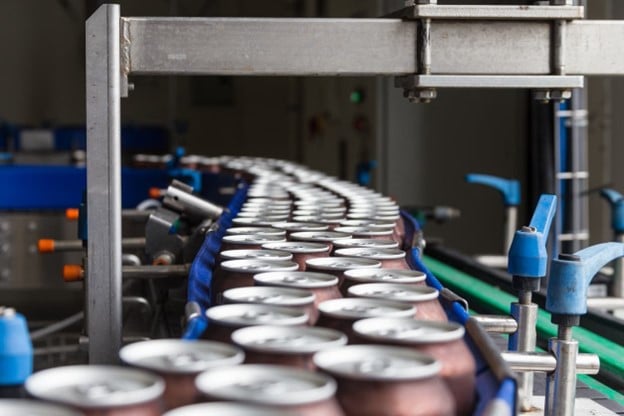
Feeling far from bubbly? Get the insights beverage companies need to meet today’s biggest supply chain challenges.
Key Takeaways
- Clogged ports, packaging shortages, and a lack of CO2 are all issues plaguing the beverage industry
- A shortage of resin for plastic bottles is exacerbated by a high tax on imports
- The big guys bought up all the aluminum cans because predictive analytics provided valuable insight
- For beverage businesses to survive, it’s time to digitally transform, gain visibility across the entire supply chain, and get the data they need to mitigate future disruption
Port congestion, shipping delays, and other supply chain disruptions are affecting industries across all economic sectors, and that includes beverages of all types. For wine and spirits companies, for example, the glass bottle shortage and shipping glitches are two of the biggest problems. Sales remain strong, but producers, importers, and retailers are all scrambling to stock the most popular releases, particularly during holiday seasons. Better long-term planning, supply planning, and just-in-time logistics are essential to address beverage industry supply chain challenges.
If the pandemic taught the supply chain nothing else, it highlighted the necessity for the consumer-focused beverage industry to embrace the value of data. Data is the foundation of a successful supply chain now and will become even more valuable over time as companies lean on their decision support platforms with predictive and prescriptive analytics.
Getting the data needed requires an investment in both supply chain talent and technology. Only the right technology will make data and analytics actionable and accessible for teams across all supply chain tiers. The insights gained through data lead not only to smoother supply chain operations but also provide game-changing business intelligence and decision support. In this article, we’ll look at the most common beverage industry supply chain challenges and the digital solutions needed to solve them.

Supply Chain Disruptions Affecting the Beverage Industry
The beverage industry is suffering from the same supply chain disruptions as most other industries. Clogged ports, a shortage of raw ingredients, Russia’s invasion of Ukraine, fires, and floods have all served to challenge the smooth flow of goods. But there are some problems unique to the constantly shifting landscape of the beverage industry.
• A shortage of aluminum coupled with high demand
China has cracked down on pollution, which has resulted in a 10% to 20% decrease in aluminum production. This is severely hampering the beverage industry, which is dependent on aluminum cans. The fact that demand has increased exponentially in recent years hasn’t helped. During the pandemic, consumers who were unable to quaff their favorite beverage in a restaurant, brewery, or bar had to drink their beverages from cans.
Major can manufacturers also cater to large companies, such as Coca-Cola and PepsiCo. As well as other bigger manufacturers, they predicted the shortage and made sure they would have what they needed. This means that smaller manufacturers were left out in the cold. And there’s no end in sight.
• A shortage of carbon dioxide
Carbon dioxide is in short supply in the U.S., affecting carbonated beverages of all kinds from sparkling water to beer. This disruption in the CO2 supply chain is not expected to get better in the short term. This shortage is caused by a couple of factors.
Gas contamination is hitting all CO2 users hard. Denbury, an independent energy company, sources CO2 from Jackson Dome, a natural carbon source field in Mississippi. When they decided to use their CO2 supply for enhanced oil recovery as well as drill additional wells for CO2, contamination occurred with the introduction of hydrocarbons that included benzene. Supply is reduced because not all suppliers can filter out the impurities.
Additionally, plant closures for annual maintenance mean even more CO2 is being pulled out of the supply chain. Ammonia plants are closing for maintenance as well, and they are a source of food-grade CO2. While these annual closures can be predicted, the issues with Denbury have made logistics planning incredibly difficult.
• A plastic resin shortage
When it comes to plastic resin, there’s a global shortage, and this is expected to continue for the foreseeable future. Demand is high, labor is in short supply, and prices have skyrocketed. Plastic manufacturers face production delays and even shutdowns because of supply chain shortages. Water bottlers in particular are suffering after the reinstatement of a tax on imported resins – $1.80 per every $1.
• Issues in trucking and shipping
Because beverages have a high turnover rate and consumers expect on-demand availability, retailers need smaller quantity shipments with more frequent delivery. This requires beverage manufacturers and distributors to be logistically agile. That requires less-than-truckload shipping, which means transport appointments, which aren’t required by full truckloads. This can result in delayed final delivery, which is where just-in-time logistics comes in.
And surprisingly, stolen cargo has been added to this list of beverage supply chain challenges. Beverage goods can be resold online and aren’t traceable. Port and facility congestion has made theft easier and comprised 14% of the thefts in 2021. This presents yet another supply chain disruption for the beverage industry.
It isn’t all doom and gloom, though. Even small manufacturers can gain an advantage over their competitors with the right decision support technology. How do you think Coke and Pepsi managed to snatch up all the resin? With a digital platform that provided the data they needed to predict the shortage before it happened.
Data Powers the Modern Beverage Supply Chain
You can’t have a resilient, effective, robust supply chain without data. You can’t plan and you can’t predict. Your supply chain remains opaque as you struggle to get supplies to meet demand. An out-of-control supply chain threatens everything from your daily operations to sales, fulfillment, and ultimately the viability of your company.
Of course, getting the right product to the right customer is the priority and the challenge, but to remain competitive, the beverage industry must embrace digital solutions that simplify decision-making and improve both profit and productivity. There’s a need for more flexibility and agility across the entire supply chain, better collaboration, and complete visibility to identify potential bottlenecks and predict supply chain shortages and other issues before they have a detrimental effect.
A transparent supply chain means you get a real-time view into what’s happening across your supply chain, even if you have several manufacturing or distribution sites. It provides a single source of truth for your entire business and gives you the data you need to make the right decisions by predicting and mitigating problems before they happen.
A digital supply chain platform can give you what you need for:
- Annual and long-term planning
- Demand planning, demand sensing, life cycle planning, and causal forecasting
- Inventory planning and optimization
- Supply and manufacturing planning and optimization, vendor management, sourcing management, and compliance management
- Supply chain network optimization
And of course, serving all these planning solutions is good data management, which, along with machine learning and artificial intelligence, accelerates decision-making, provides deeper insights, and increases supply chain agility. Effective supply chain data management will:
- Ensure inventory is optimized to meet service goals and service level agreements
- Reduce last-minute, expensive shipping due to errors
- Increase perfect orders
- Ensure your organization is more demand-centric
- Reduce exceptions and firefighting
- Increase customer satisfaction through improvements in product availability.
Many of today’s beverage industry leaders are embracing digital transformation, which leads to better business outcomes. With beverage industry supply chain challenges and disruptions showing no signs of easing any time soon, it’s time to be proactive rather than panicky. Use this as an opportunity to define, refine, and re-align your supply chain to weather disruptions today and create a more secure future.
Technology Built for Beverage Supply Chain Success
Logility provides supply chain solutions that allow you to trace your supply chain end to end. We give you the visibility and data you need to optimize your supply chain to weather any disruption. Our platform utilizes AI, machine learning, and automation to help you easily track and analyze your supply chain, so you always have optimal performance and key insights. Make better decisions and make more profits. Contact us today.
For more reading on the biggest challenges facing the beverage industry today, and the best digital solutions to address these challenges, check out this eBook: A Recipe for Resilience: Strategies to Strengthen Your Food and Beverage Supply Chain


